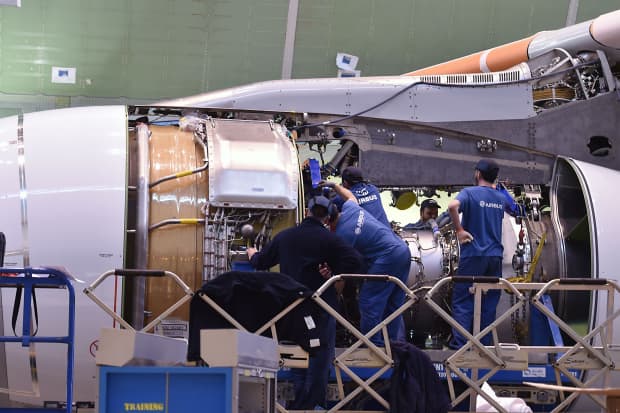This post was originally published on this site

Plane makers saw zero aircraft orders in September, as the pandemic continues to devastate the industry.
pascal pavani/Agence France-Presse/Getty Images
Commercial aircraft orders for the third quarter sank to the lowest on record, with just 13 aircraft orders placed worldwide, as the COVID-19 pandemic paralyzed demand for travel, forcing airlines to delay accepting new jets.
There were no orders for new aircraft in September. This followed just four and nine orders in July and August respectively, representing a 91.4% drop on the same quarter in 2019, aerospace and defense lobby group ADS said on Monday.
Commercial aircraft deliveries for the same period also showed the devastating impact the pandemic has had on the sector, with 173 aircraft being delivered, marking the worst third quarter on record. Of these, 135 were single-aisle planes and just 38 were wide-body aircraft, because of the sharp slump in long-haul international travel.
Read: Boeing Delivered 11 Aircraft in September, but Won No New Orders
While ADS said September had seen an uptick in deliveries to levels similar to February this year, before lockdowns happened across the globe, they were still far below expected levels for this time of year.
ADS Chief Executive Paul Everitt said the aerospace and aviation industries have invested in robust health and safety measures as part of aircraft design, which makes the risk of transmission when traveling aboard an aircraft extremely low.
“The quarantine period that passengers face when they return home is one of the main barriers to U.K. aviation’s recovery and testing can play a major role in reducing this. The government should rapidly implement a testing regime so that the 14-day quarantine period can be shortened.”
Read: United Airlines tests COVID-19 ‘health pass’ to kick-start global travel again
“This will help improve confidence among travelers and in turn put the aviation and aerospace sectors on a path toward recovery,” Everitt said.
The slump in deliveries has triggered a wave of job losses in the sector. The world’s largest plane maker Airbus AIR, -3.20% said on Oct. 23 that it would eliminate 15,000 jobs, mostly in Europe, to safeguard its future, and warned of challenging times ahead. The cuts represent around 10% of its global workforce of around 135,000 people.
Read: Airbus Wins Mars Spacecraft Contract. Why the Stock Is Falling.
With air traffic not expected to recover to pre-COVID levels before 2023 and potentially as late as 2025, Airbus EADSY, -3.38% now needs to take “additional measures,” the company said in a statement.
The cuts come despite a €15 billion ($17.7 billion) government rescue package for France’s aerospace industry, announced earlier in October.
Read: Rolls-Royce Seeks $6.4 Billion to Bolster Its Struggling Balance Sheet
Meanwhile, Rolls-Royce RR, -7.22% announced plans to raise £2 billion ($2.6 billion) in a rescue rights issue, as part of a package to shore up the aircraft engine-maker’s balance sheet, which has been battered by the pandemic. The fundraising comes on top of a major restructuring announced in May that will see it cut 9,000 jobs globally and close several production sites.

